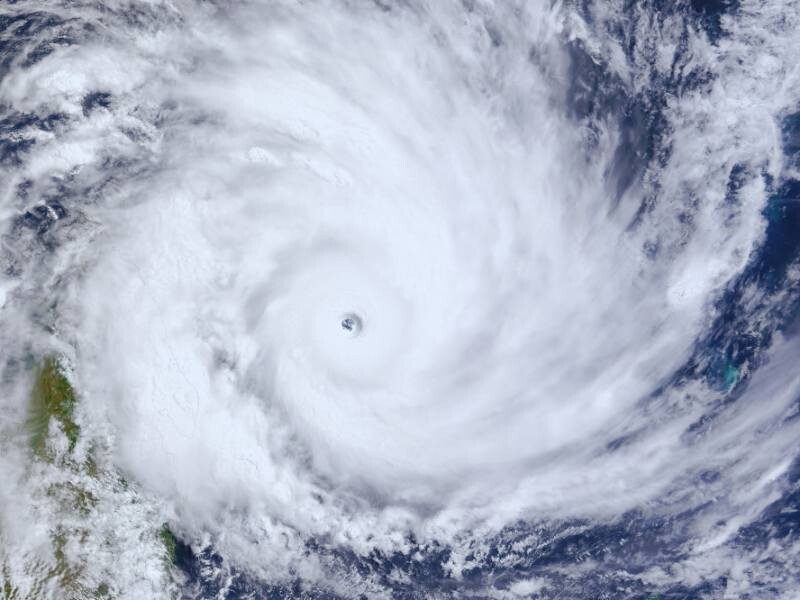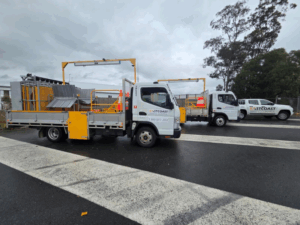As North Queensland gears up for another cyclone season, the region braces for the unpredictable and often severe weather patterns that can disrupt daily life and create complex logistical challenges. This year, with Hurricane Milton recently making headlines in the USA, it’s a timely reminder of the significant impact that such storms can have on communities, infrastructure, and businesses. For traffic management teams like East Coast Traffic Control (ECTC), preparing for these extreme weather events means implementing robust strategies to ensure the safety and continuity of vital services throughout the cyclone-prone areas of Queensland.
Cyclone Season in North Queensland: What to Expect
Cyclone season typically runs from November to April in Queensland, with the peak period occurring between January and March. During this time, communities in North Queensland—spanning from Mackay and Townsville to Cairns—often face heavy rainfall, strong winds, and flooding. These conditions not only pose a direct threat to people and properties but can also create dangerous road conditions and disrupt traffic flow.
The recent devastation caused by Hurricane Milton in Florida has demonstrated just how quickly severe weather can escalate, making it crucial for traffic management teams to be on high alert. With these unpredictable weather events in mind, ECTC has ramped up its preparations and adapted its strategies to meet the unique demands of cyclone season in North Queensland.
The Role of Traffic Control in Cyclone Preparedness
Traffic control is a key component in managing the aftermath of natural disasters like cyclones. In North Queensland, the role of traffic controllers goes beyond the usual management of roadworks and construction sites; it extends to maintaining order during evacuations, redirecting traffic away from hazardous areas, and ensuring that emergency vehicles have unimpeded access to affected zones.
Ensuring Safety for Communities and Workers
When cyclones hit, road conditions can deteriorate rapidly, making it unsafe for vehicles to navigate certain areas. Flooded roads, fallen trees, and downed power lines are common occurrences that can obstruct traffic and pose significant risks to both drivers and pedestrians. ECTC’s teams are trained to respond quickly to these situations, setting up barriers and signage to alert motorists of dangers and working closely with local authorities to reroute traffic safely.
Supporting Emergency and Recovery Efforts
In the aftermath of a cyclone, swift and efficient traffic control becomes essential for supporting emergency response and recovery efforts. ECTC’s experience in North Queensland has shown that clear communication and rapid deployment are crucial for minimising delays and ensuring that emergency services can reach those in need. Our traffic controllers work alongside emergency crews to secure roads, manage detours, and keep access points open for essential services.
Why ECTC Is Uniquely Positioned to Handle Cyclone Challenges
ECTC has a long history of working in cyclone-prone regions, making us uniquely equipped to tackle the challenges that come with severe weather events. Our teams understand the terrain and weather patterns of North Queensland and have established strong partnerships with local councils, utility companies, and emergency services to facilitate coordinated responses.
Local Knowledge and Expertise
Having depots across North Queensland means that ECTC is able to deploy resources quickly and efficiently. Our presence in key areas such as Townsville, Cairns, and Mackay enables us to respond to emergencies and weather-related disruptions in real time. This local knowledge, combined with our industry-leading safety protocols, ensures that we are always prepared to support communities before, during, and after a cyclone.
Advanced Training and Equipment
Our traffic controllers are equipped with specialised training to handle extreme weather conditions. This includes knowing how to manage road closures, set up safe detours, and communicate effectively with emergency services. Additionally, we invest in state-of-the-art equipment that allows us to operate safely even in the most challenging environments.
Preparing for the Unexpected: Proactive Strategies for Cyclone Season
While it’s impossible to predict exactly how severe a cyclone season will be, proactive planning and preparation can significantly mitigate the risks. At ECTC, we take a proactive approach by conducting regular training exercises, reviewing emergency response plans, and collaborating with stakeholders to ensure we’re ready to act at a moment’s notice.
Scenario Planning and Simulation
Our teams participate in scenario planning and simulation exercises designed to replicate the conditions typically experienced during a cyclone. These simulations help identify potential challenges and ensure that every team member is familiar with their role and responsibilities.
Continuous Communication and Coordination
Clear communication is essential for effective traffic management during extreme weather events. ECTC maintains an open line of communication with local authorities and emergency services to stay informed about the latest weather updates and road conditions. This allows us to adjust our strategies in real-time and provide accurate information to motorists.
Partnering with the Community to Build Resilience
Building resilience against natural disasters is a collective effort that involves local communities, businesses, and government agencies. ECTC is committed to being a reliable partner in this endeavour. By supporting local initiatives, participating in community awareness campaigns, and providing traffic control services that prioritise safety, we contribute to the overall resilience of North Queensland.
The Future of Traffic Control in a Changing Climate
As weather patterns become increasingly erratic due to climate change, the role of traffic control in managing extreme weather events will continue to grow in importance. ECTC is at the forefront of adapting to these changes, using our experience and resources to develop innovative solutions that keep people safe and minimise disruptions.
Final Word: Be Prepared, Stay Safe
Cyclone season in North Queensland is a time of heightened risk, but with the right preparations and support, communities can weather the storm safely. At ECTC, we’re dedicated to providing the traffic control services needed to keep roads safe and accessible during these challenging times. Whether it’s managing evacuations, supporting emergency crews, or rerouting traffic away from danger zones, our team is ready to respond.
FAQs
- What are the main challenges for traffic control during cyclone season?
The main challenges include managing road closures, ensuring safety during evacuations, and maintaining access for emergency services amid rapidly changing weather conditions. - How does ECTC prepare for cyclone season in North Queensland?
ECTC prepares by conducting training exercises, maintaining regular communication with local authorities, and deploying resources strategically to cyclone-prone areas. - How can traffic control support emergency services during a cyclone?
Traffic control helps by managing road closures, rerouting traffic, and ensuring emergency vehicles have clear access to affected areas. - What makes ECTC uniquely qualified to handle traffic control during extreme weather events?
ECTC’s extensive experience in cyclone-prone regions, local knowledge, and advanced training make us uniquely equipped to handle traffic control challenges during severe weather. - How can local communities stay informed during cyclone season?
Local communities can stay informed by following weather updates, adhering to emergency instructions, and keeping an eye on local council announcements and ECTC’s social media channels for road closure information.





